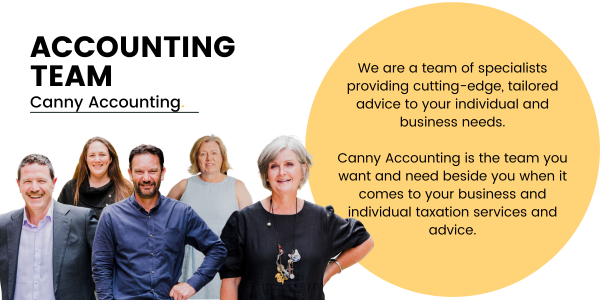Getting Your Business Structure Right!
Written By: Canny Accounting
When starting a business it’s important to get your business structure right! So what is a business structure?
Your choice of structure will depend on the size and type of business and also how you want to run it. Each structure may have an impact on key areas such as tax, asset protection and set-up costs.
The four most commonly used business structures in Australia are:
- Sole Trader
- Partnership
- Company
- Trust
You’re not locked into any structure and better yet, you can change the structure as your business changes or as it grows. But how do you know if and when you need to change your business structure? We go through the most common structures, their pros and cons as well as how to determine which is the best structure for you! Our team at Canny Accounting are the Accountants Geelong trust when it comes to business structures and being able to know the signs of when it might be in your best interest to change structures to better your business.
Types of Business Structures
Sole Trader
A sole trader is an individual running a business. It is the simplest and cheapest business structure. If you operate as a sole trader, you are the only owner and you manage the business. You are legally responsible for all aspects of the business. All that is needed is to register for an Australian Business Number (ABN). A sole trade must be registered for GST if his or her annual turnover is $75,000 or more.
Some of the attractions of setting us as a sole trader include:
- It is easy to set up, with minimal start-up costs and less paperwork than other structures;
- A sole trader has complete control of the business and keeps all of the profits;
- It offers privacy (in comparison to the reporting requirements of other structures); and
- It is easy to change the legal structure, later if need be.
On the other hand, some of the disadvantages of setting up as a sole trader include:
- Due to trading alone, sole traders bear the full responsibility for any liabilities arising out of the business;
- This can extend to the owner’s personal assets to pay business debts;
- Tax is paid at the sole trader’s marginal tax rate, which may be higher than the company tax rate;
- It can be difficult to raise finance; and
- The business ceases to exist upon the death of the sole trader. As such, continuity of the business is limited and succession planning is difficult.
Partnership
A partnership is when two or more people operate a business as co-owners and share income. All co-owners (i.e. partners) act on behalf of each other in the business. Like the sole trader business structure, a partnership entity is not separate from its operations.
Some of the advantages of setting up as a partnership include:
- Partnerships are easier and less expensive than companies to set up;
- Partners may carry on business under a trading (business) name;
- Partnerships combine the resources and expertise of people;
- Partnerships are similar to administer. Profits and losses are shared between partners according to his/her share (as specified in the ‘partnership agreement’);
- Unlike companies, partnerships do not have to disclose their profits to the public (i.e. greater privacy); and
- Changing the legal structure is relatively simple (i.e. changing from a partnership into a company at a later stage).
However, there are some disadvantages of partnerships, including:
- All partners together are personally responsible for business debts. Each partner is individually liable for debts incurred by the other partners. This is known as being ‘jointly and severally liable (i.e. unlimited liability);
- All partners have a right to participate in the management of the partnership (unless otherwise agreed);
- Tax is charged at the personal tax rate. As business earnings increase, so does the tax rate;
- Partners cannot transfer their ownership to someone outside the partnership unless the other partner(s) agree;
- Personal differences may interfere with business; and
- You need to lodge a separate tax return for partnerships.
Company
By law, a company is a distinct legal entity separate from its shareholders or officers. In Australia, the most common types of companies are:
- ‘Proprietary Limited’ Companies (cannot raise money from the general public through share issues)
- ‘Public’ Companies (usually formed to raise or borrow public money by listing the company’s shares for trading on the stock exchange
The vast majority of incorporated organisations in Australia are ‘proprietary limited’ or private companies. These companies have shareholders, company directors and managers who are typically the same two or three people.
All companies are governed by the Australian Securities and Investments Commission (ASIC), which administers the Corporations Act 2001 (Cwlth) and other legislation. Public companies must also comply with the rules of the Australian Stock Exchange.
Advantages of companies include:
- Generally, shareholders can only lose the value of their shares and are not liable for the company’s debts (i.e. limited liability);
- Legal arrangements are in the company’s name, not in the name of its directors and managers;
- The business structure ensures continuity of management and ownership in the event of the death or disability of key people (because company shares may be transferred); and
- The tax rate for companies is less than the highest rate for individuals.
However, the disadvantages of companies can include:
- Companies are more regulated than other business structures;
- The rules for establishing and running a company are more complex and costly than other business structures;
- Lessors, suppliers and lenders are reluctant to lend money or enter into contracts or leases with proprietary limited companies unless directors or shareholders provide personal guarantees;
- If directors fail to meet their legal obligations, they may be held personally liable for the company’s debts;
- Profits distributed by companies to shareholders are taxable; and
- Need to lodge a separate tax return for the company.
Trust
A trust is a relationship where a trustee (an individual or a company) carries on business for the benefit of other people (the beneficiaries). For instance, a trustee may carry on a business for the benefit of a particular family and distribute the yearly profit to them.
A trust may be discretionary (i.e. the trustee decides how profits will be distributed among beneficiaries) or have fixed interests (i.e. it will benefit certain people in predetermined proportions). Commonly, the trustee is a company (a corporate trustee); often this business structure is more tax effective.
Advantages of a trust can include:
- A trust provides asset protection and limits liability in relation to the business;
- Trusts separate the control of an asset from the owner of the asset and so may be useful for protecting the income or assets of a young person or a family unit;
- Trusts are very flexible for tax purposes. A discretionary trust provides flexibility in the distribution of income and capital gains among beneficiaries;
- Beneficiaries of a trust are generally not liable for the trust debts, unlike sole traders or partnerships; and
- Beneficiaries of a trust pay tax on income they receive from a trust at their own marginal rates.
Disadvantages of a trust can include:
- Establishing a trust costs significantly more than establishing sole traders and partnerships;
- A trust is a complex legal structure, which must be set up by a solicitor or an accountant;
- The trustee has a strict obligation to hold and manage the property for the exclusive benefit of the beneficiaries;
- Operation of the business is limited to the conditions outlined in the trust deed;
- As with companies, there are extensive regulations that trusts must comply with;
- Losses derived in a trust are not distributable and cannot be offset by beneficiaries against other income they may have;
- Unlike a company, a trust cannot retain profits for expansion without being subject to penalty rates of tax; and
- Need to lodge a separate tax return for the trust.
Structures Of A Business + The Best One For You
The best structure depends on your circumstances! Factors that determine the best structure for you include:
- Tax
- Compliance Costs
- Asset Protection
- Succession Planning
What Happens If Your Business Plan Structure Needs Changing?
A change in business structure often means that you want to re-organise the governance structure of your business. Usually, you do this to be more profitable, improve processes and adapt to the changing needs of your business.
A business structure is often the first change you will make when your business grows. Particularly, if you start as a sole trader and then want to take on a partner or register as a company.
When you change your business structure, you need to understand your reasons for this change. A business structure change can have implications for your business’s legal and tax obligations as well as your personal liability.
A few common reasons to change your business structure include:
- Change in management – you may take on a business partner and decide to change from a sole trader to a partnership structure;
- Change in ownership – if you buy an existing business, you may decide to change the business structure to meet your goals for the business;
- Financial reasons – you may restructure to meet financial goals and objectives, such as improving cash flow or profitability of the business;
- Operational reasons – you may reorganise your internal functions, such as sales and marketing, to improve the way your business operations; and
- Economic downturn or downsizing – you may want to downsize or simplify your business structure, for example moving from a company to a sole trader.
Signs From Your Financial Information It Might Be Time For A Structure Change
There are a number of signs that could indicate you need to change your business structure, some of these include:
- Taking on a business partner;
- You need greater protection for personal liability;
- Significant increase in the activity, profit and assets of your business;
- You require finance;
- You are paying a lot of income tax;
- You are getting close to retirement or looking to sell; and
- You want to downsize or simplify.
Speak To The Accountants Geelong Trusts For Your Business
Canny Group has been assisting the community, near and far for over 60 years with showing shrewdness and good judgement, especially in money or business matters and that includes ensuring that your business is structured in the best way possible.
If you think it might be time to review your current business structure, or you’re just starting out your business venture and want to get it right from the start, get in touch with our team to have a chat!





